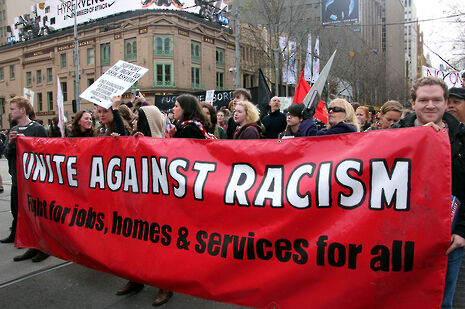How to go from ally to accomplice
In the first instalment of her column, Waithera Sebatindira outlines how white accomplices can fight against the femonationalism practised by right-wingers and self-professed feminists
CN: racism, xenophobia, Islamophobia

As the right rises in the Western world, anti-racist activists led by people of colour (PoC) have been tackling the normalisation of extreme white supremacist views that have characterised this political shift. Efforts have varied from organising demonstrations to writing blog posts, and through this column I am interested in exploring what white people can do day-to-day to upend white supremacy.
By now, many people are familiar with the term ‘white ally’. This is a person who expresses a commitment to helping PoC challenge structural inequalities. However, I have two issues with the term. The first is that it is frequently co-opted by white people who, with good intentions, call themselves allies to the cause while their engagement with it is solely performative.
“White feminism universalises the lived experiences and needs of white women at the expense of women and gender non-conforming people of colour”
The second relates to the term ‘ally’ itself. The word connotes a mutual benefit or goal. But while all anti-racists strive towards societies free of white supremacy, the meaning of that change is fundamentally different for PoC as compared to white people. As prominent black feminist Feminista Jones said to a rally following the Charleston massacre in 2015, white people and PoC “are not working together on a mutual goal. My goal is to live. [White people] don’t have that same goal.”
I prefer the term ‘accomplice’. A white accomplice actively and directly challenges white supremacist people, policies, institutions, and cultural norms. They know they do not have the same stake in the fight, but they are willing to roll up their sleeves and work with PoC at our instruction. The difference is not simply semantic. Accomplices do not just talk about racism, they do something about it.
This is a pertinent issue within western feminist movements, particularly where white feminism is concerned. White feminism generally denotes a brand of feminism that centres and universalises the lived experiences and needs of white (usually cis, straight, and middle-class) women at the expense of women and gender non-conforming people of colour.
A prime example is the rise of what has been termed ‘femonationalism’. Femonationalism is a theoretical framework used to analyse the deployment of gender equality arguments to further racist, xenophobic, and Islamophobic campaigns: specifically, the ways in which right-wing nationalists, neoliberals, and women’s rights activists can come together to stigmatise Muslim and South Asian men as threats to (white) women’s rights in European countries. It is telling, for example, that Nigel Farage publicly claimed in 2016 that increased migration would put British (read: white) women at risk of sexual assault, even though (like most far-right parties) UKIP’s manifesto lacks concrete policies to tackle gendered violence across Britain.
But white feminists are guilty of this, too. Sarah Champion’s incendiary article calling for Brits to acknowledge that Pakistani men are preying on white girls served the exact same purpose. The Brown Hijabi provides an excellent takedown of her article, but it is worth pointing out here that this narrative erases sexual violence suffered by girls and women of colour. Champion pretends that she is voicing a controversial view, even though Orientalist tropes about the violent sexuality of brown men have been perpetuated and accepted for centuries. She also seeks to criminalise a community that includes women – Pakistani women who, themselves, are trying to tackle sexual violence within their communities and across British society.
“The alliance between nationalists and self-professed feminists under femonationalism is not accidental”
This goes beyond white women trying to save brown women, especially in the current political climate. Weaponising racism and Islamophobia in the name of women’s rights is peak white feminism. This is not to say that sexism and sexual violence, when carried out by PoC, should not be discussed. But it is being discussed. Across PoC’s communities, solutions are being formed and implemented. There is a difference between these discussions and prominent white women with national platforms using language couched in racist stereotypes to suggest that misogyny can stem from Pakistani, South Asian, or Muslim identity, and failing to platform and support the WoC doing feminist work. Erasing them implicitly feeds the stereotype that these women are passively accepting or complicit in this violence.
It is absolutely crucial to acknowledge that the alliance between nationalists and self-professed feminists under femonationalism is not accidental. At its root is a belief in the supremacy of European culture and values. These groups share the same history and legacy of applying prejudices to colonised subjects. They other marginalised people, justifying their surveillance and the stigma that surrounds them. And they offer no sustainable solutions to the problems they discuss.
Femonationalism is not the feminism of white accomplices, it is white feminism. White feminists who seek to help WoC should firstly question why they feel their specific contribution would be useful. Will they be providing a platform, or resources generally withheld from WoC? And if they think they can be genuinely useful they should work entirely under the instruction of women in those communities.
Most importantly, white feminists should know that their best work as accomplices will be done within white communities: calling out white feminists who engage in femonationalism, pointing out the hypocrisy of right-wing politicians justifying racism via femonationalism, challenging neoliberal peers who find it easier to blame Islam for gendered violence than to consider the role played by failures of the state, and creating a space for WoC to bring about their liberation without having to simultaneously tackle this weaponised racism and Islamophobia
 News / Hundreds of Cambridge academics demand vote on fate of vet course20 February 2026
News / Hundreds of Cambridge academics demand vote on fate of vet course20 February 2026 News / Judge Business School advisor resigns over Epstein and Andrew links18 February 2026
News / Judge Business School advisor resigns over Epstein and Andrew links18 February 2026 News / Petition demands University reverse decision on vegan menu20 February 2026
News / Petition demands University reverse decision on vegan menu20 February 2026 News / CUCA members attend Reform rally in London20 February 2026
News / CUCA members attend Reform rally in London20 February 2026 News / Caius students fail to pass Pride flag proposal20 February 2026
News / Caius students fail to pass Pride flag proposal20 February 2026










